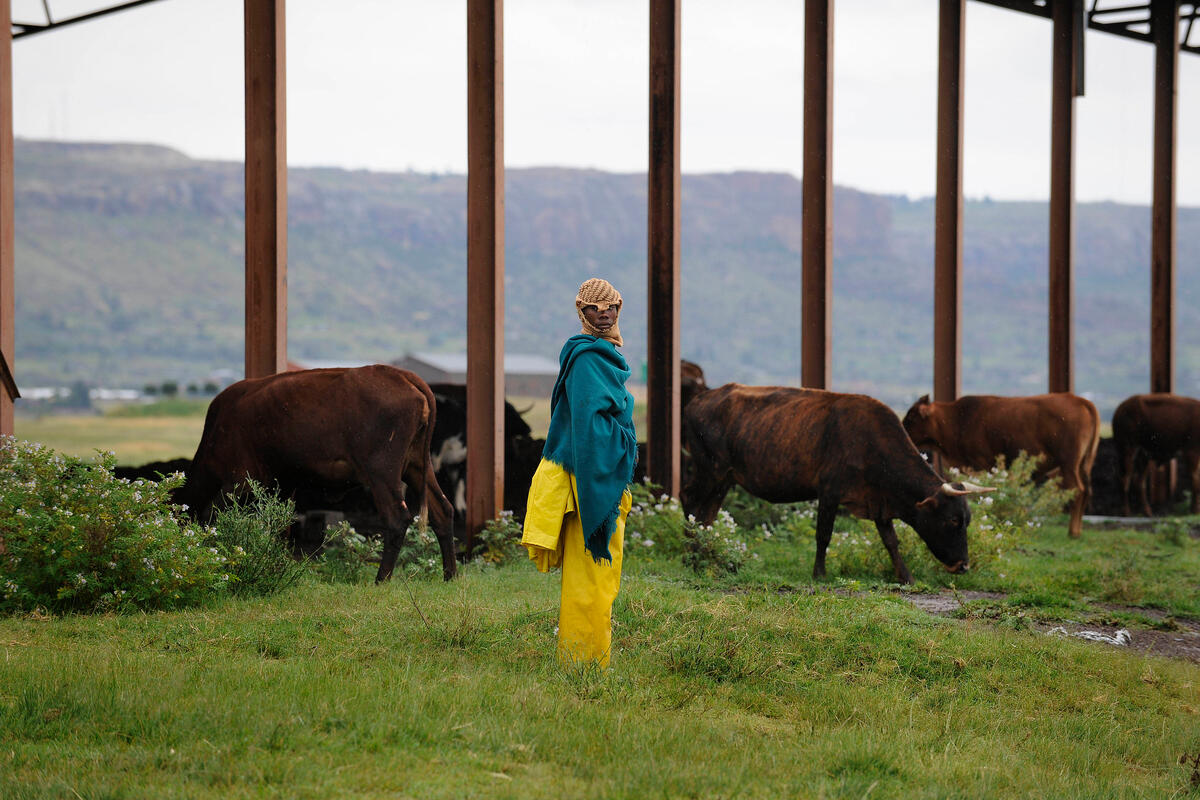HASTEN lecture: A systemic approach to SDG interlinkages - Understanding complexity and fostering policy integration for sustainable development
11/11/2025

©FAO/Gianluigi Guercia
Background
In 2024, FAO launched the HASTEN project to empower the next-generation of agrifood leaders in Lesotho, Sierra Leone, and Rwanda to drive sustainable agrifood systems transformation. This lecture series is the second element of the project’s capacity-building component, designed in response to country-identified priorities and knowledge gaps. Targeting young professionals across public, private and academic sectors, the series emphasizes transdisciplinary systems thinking and SDG interlinkages. The sessions build on findings from inception missions and a capacity survey, as well as insights from a 2025 study visit to Ireland. The lectures aim to deepen understanding of systems transformation and inspire context-relevant leadership and innovation across sectors.
Lecture: 'A systemic approach to SDG interlinkages - Understanding complexity and fostering policy integration for sustainable development'
This second lecture in the HASTEN series, presented by the Stockholm Environment Institute (SEI), will enhance understanding of SDG interlinkages and strengthen policy integration for sustainable development. The session will provide an overview of how SDG interactions are conceptualized and why understanding synergies and trade-offs — particularly in agrifood systems — is critical for policymaking. SEI will present its SDG Synergies approach, a soft-systems, cross-impact and participatory method for assessing how progress on one SDG target affects others, and demonstrate the SDG Synergies web-based tool. Participants will take part in a short interactive poll to understand the scoring process, followed by real-world case studies from Malawi and Sri Lanka. The session will conclude with Q&A and reflections on how this approach can support systems thinking and more coherent and integrated policy decisions for sustainable development.
📅 Tuesday, 11 November 2025
🕓 14:00–15:30 CET
🔗 Register here
Agenda
| 14:00 | Opening and welcome Hajnalka Petrics, Lead Technical Officer for FAO HASTEN, FAO Office of Sustainable Development Goals |
| 14:10 | A systemic approach to SDG interlinkages - Understanding complexity and fostering policy integration for sustainable development: The SDG synergies tool Ivonne Lobos Alva, Team Leader: Sustainable Transitions; Senior Expert, SEI Latin America |
| 14:40 | Practical case studies from Malawi and Sri Lanka Daniela Maestre, Research Associate, SEI Latin America |
| 15:00 | Q&A |
| 15:20 | Reflection on discussion Ivonne Lobos Alva, Team Leader: Sustainable Transitions; Senior Expert, SEI Latin America |
| 15:25 | Closing Hajnalka Petrics, Lead Technical Officer for FAO HASTEN, FAO Office of Sustainable Development Goals |
Speakers
 | Moderator Hajnalka Petrics Office of SDGs, FAO Hajnalka Petrics is a Programme Officer at FAO's Office of Sustainable Development Goals, where she leads the Prototyping and Acceleration Portfolio. She heads the FAO SDG Agrifood Accelerator Programme and the HASTEN FVC Project, which promote eco-inclusive and social agripreneurship. Previously, she was the Global Coordinator of the RBA-EU Joint Programme on Gender Transformative Approaches for Food Security and Nutrition. She also served as a Gender and Development Officer in FAO’s Gender Team, leading work on CEDAW implementation, gender-responsive policies, and rural advisory services. Earlier in her career, she was a Rural Development and Gender Technical Officer at FAO's Regional Office for Europe and Central Asia. Hajnalka holds a PhD in International Cooperation and Sustainable Development Policies, and an MA in Policies and Governance of European Integration from the University of Bologna.
|
.png?sfvrsn=c644b9b6_1) | Ivonne Lobos Alva Ivonne Lobos Alva is the Team Leader of Sustainable Transitions and a Senior Expert at SEI Latin America. She focuses on managing sustainability research and policy projects. She currently supports the implementation, follow-up, and review of the 2030 Agenda and Sustainable Development Goals (SDGs). She is a sustainability expert with over a decade of experience equally divided between scientific institutions and international development organizations. Her key areas of interest include the sustainable management of natural resources, the transformation toward sustainable food systems, and the formulation and implementation of global sustainability agreements. She combines her research and management experience with a passion for designing participatory processes and has implemented over 50 multi-stakeholder dialogues. She has extensive knowledge of the United Nations system and is systematically engaged in negotiating the Sustainable Development Goals (SDGs) as a researcher. She focuses her work on solutions for sustainable development and natural resource management at the global level, with a special interest in and expertise in Latin America and Europe. She holds an MSc in environmental governance from Albert-Ludwigs-University Freiburg in Germany.
|
.png?sfvrsn=a99478b6_1) | Daniela Maestre Daniela’s work addresses the transformation of food systems towards sustainability, with a particular focus on planetary, human and animal health, and equity and gender issues within these systems. She holds an M.A. in Interdisciplinary Development Studies from the Universidad de Los Andes, in Colombia. |


.jpg?sfvrsn=b2352e76_0)



